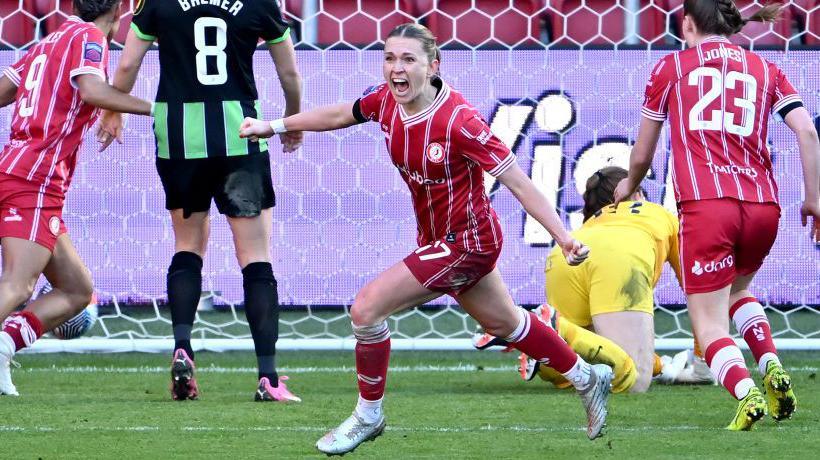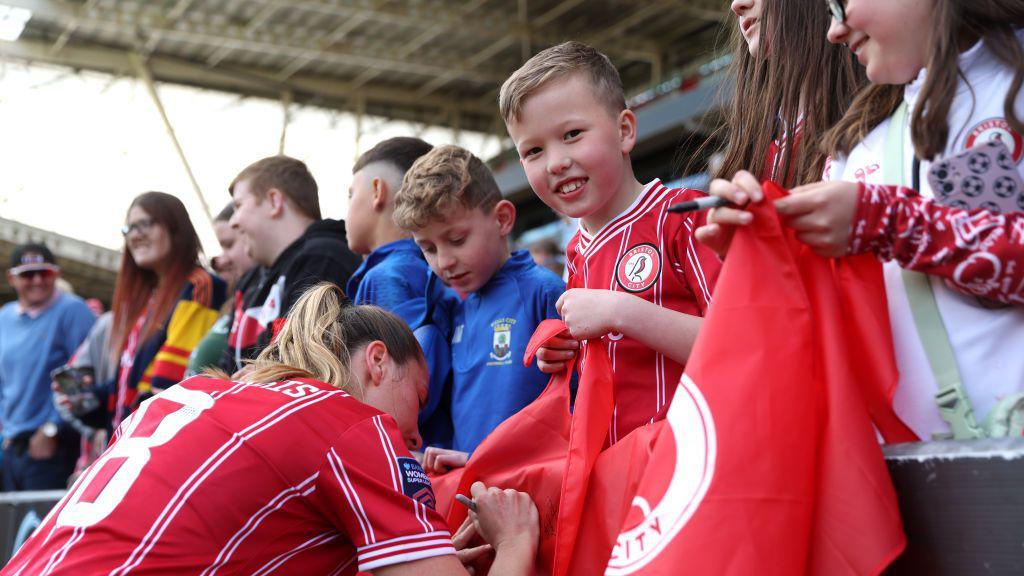Why have Bristol City had such a bad WSL season?
- Published
After a long, hard season of struggle, Bristol City's increasingly inevitable exit from the Women's Super League was confirmed on Sunday.
Their 4-0 home defeat by Manchester City ensures an immediate return to the Championship for the Robins, who won the second tier last season.
Lauren Smith's side have lost all 10 of their home league games so far. They face Everton on the final day, aiming to avoid a whitewash at Ashton Gate in 2023-24.
Bristol City have never been outside the WSL bottom two all season, sinking to the very foot of the table at the start of 2024 and never resurfacing.
Who will come out on top in WSL title race?
- Published15 May 2024
'No-one expected this' - Crystal Palace reach WSL
- Published28 April 2024
By every statistical metric, it has been a horrible season for City. They are on course for the lowest points tally from a 22-game WSL season.
They need to win their final two games - including a visit to Chelsea - to surpass the 11 attained by Birmingham City and Reading, the teams relegated in the previous two campaigns.
Only two WSL sides who did not have points deductions have ever had a worse points-per-game record than Bristol City's current 0.3 - Doncaster Rovers Belles in 2016, and Yeovil in 2018.
So tough have the Robins found this campaign, they are on course for their lowest number of points ever in a women’s top flight season – even worse than in 2015 when, as Bristol Academy, they recorded eight points from a 14-match campaign.
The question is this: why have things been this bad?
It is true that Bristol, in their various guises, have always found it tricky to compete with the big girls of the WSL. Unlike the Arsenals and Chelseas of this world, Bristol do not have billionaire Premier League brothers with which to share facilities.
Their demise this season makes Bristol the first team to have been relegated from the top division on three different occasions since the WSL was formed in 2011.
But as their points total indicates, this has been a more comprehensive relegation than any suffered by the club previously.
'We can take success from this season'

Amalie Thestrup has scored 45% of Bristol City's goals in the WSL this season
Such have been Bristol City’s struggles, concern has been raised about a growing gap between the WSL and the Championship and a chasm similar to that seen between the men's Premier League and Championship could form.
Smith's group are the first promoted team to go straight down from the WSL since Doncaster in 2016.
The manager sensed a gap to the elite when building her squad for this season, and throughout such a difficult campaign.
Before the 1-0 home defeat to Liverpool in mid April, Smith said: "We have a young team - a team of teenagers. Our ethos is developing young talent; we are all proud of it.
"Even the ones who aren't teenagers are young to the WSL, and they have done well. When we look at what we are about, we can take success from this season.
"It depends on the lens you are looking through."
Smith is correct to point to the inexperience of her team. Bristol City have the youngest average age of any starting XI in the WSL this season, at 24 years and 148 days. It is more than a year younger than the next side (Manchester City, with an average of 25y 306d).
A lack of WSL nous as a whole has told. Of the 30 senior players registered on the Bristol City books, only six have made more than 50 WSL appearances.
Smith was given rein to bolster her squad for the fight, with 14 signings – 11 permanent, with three on loan. But only three of the 11 full-time acquisitions came from fellow WSL teams.
Few can be called immediate hits either, with the truly successful signing being striker Amalie Thestrup. The Danish striker, signed from PSV last summer, has scored nine league goals – impressive considering the team have managed a total of 20.
At the back, it has been chaos with 58 goals conceded – a league high. A shorthand for the chaos can be seen in four goalkeepers being used in the WSL.
Kaylan Marckese was signed on loan from Arsenal in the summer but played only four times before returning to London in January. Shae Yanez was signed from San Diego Wave as her replacement, while Olivia Clark and Fran Bentley have also made league appearances between the sticks.
'We're incredibly proud of the fans'

Bristol City's home WSL attendances have not dipped under 3,400 this season, with more than 14,000 at the game against Manchester United
Ultimately, the major positive for Bristol City this season has not been their on-field form but the feverish support they have garnered off it.
"We've shown as a club we have this huge fanbase, we have this huge community that supports us," said Smith. "We love stepping out there and hearing the roar. Then we thank them at the end of the game, it's what they deserve. They are with us through thick and thin."
An attendance of 8,749 watched the relegation-confirming loss to Manchester City, while a bumper 14,138 saw a 2-0 defeat to Manchester United in November.
City have had the fifth highest average home attendance in WSL - 7,260 - behind only the top four who have had games at Premier League grounds this campaign. City's own home crowds have been helped by playing all their home games at Ashton Gate, sharing with the men's team.
That arrangement will continue next season, while Smith has been assured she has the club's "full backing" as the team head back to the second tier.
"I think it's unbelievable the numbers that are coming out," said Smith. "They've been brilliant, the numbers that have got behind us. We're just incredibly proud of those things."
The matchday experience is a NewCo dream, with entertainment perhaps more suited to Glastonbury than a professional football match.
This season's struggles could be boiled down to the club's home game against second-bottom West Ham in January.
Twerking mascots, a pounding soundtrack from the Ashton Gate DJ and a pre-match multi-table sticker swap all featured. At half-time on the pitch, there was a relay race between fans dressed in inflatable fruit costumes.
Amid all the fun and games, City lost 2-1 to the only side they could have realistically overtaken in their survival bid, and began their slow walk to relegation.